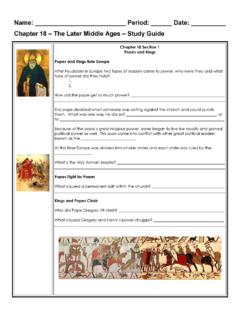Transcription of WOMEN IN ANCIENT ATHENS: A PRIMARY …
1 WOMEN IN ANCIENT ATHENS: A PRIMARY SOURCE investigation OF their ROLES. Jason Freewalt 4358488. Greek Civilization HIST531 K001 Sum 13. Dr. Leslie Kelly American Military University November 1, 2013. The ANCIENT city of Athens was the birthplace of democracy and the origin of many aspects of Western Civilization. However, not every resident of Athens had an equal opportunity to participate fully in government, commerce, and religious ceremonies due to barriers created by gender inequality, citizenship status, age discrimination, and the bonds of slavery. WOMEN , metics, children, and slaves were underrepresented in Athenian government. Furthermore, their roles in Athenian society are often difficult for historians today to discern. While entire books have been written on the marginalization of these underrepresented members of Athenian society, the current paper will focus primarily on the role of WOMEN .
2 Examining numerous ANCIENT sources, one can conclude that WOMEN had a great impact on life in Athens in many ways, taking both active and passive roles. Four very telling historical examples of the views of WOMEN in ANCIENT Athens come from Thucydides, Socrates, and Quintus Curtius Rufus. In Pericles' funeral oration during the Peloponnesian War, Thucydides writes, Great will be your glory in not falling short of your natural character; and greatest will be hers who is least talked of among the men whether for good or for bad. 1 In other words, the natural character of WOMEN was for them to remain in the background and out of the way. In contrast, Plato, in The Republic, relates a conversation in which Glaucon tells Socrates, Many WOMEN , it is true, are better than many men in many things. 2 Socrates and Glaucon continue the conversation by reaching the conclusion that men and WOMEN should be educated in common and should serve as guardians Such a view 1.
3 Thuc. ; all translations of Thucydides are taken from The Peloponnesian War (London: J. M. Dent; New York: E. P. Dutton, 1910), as published online in Perseus Digital Library, ed. Gregory R. Crane, :cts: :1 (accessed November 1, 2013). 2. Plat. Rep. ; all translations of Plato are taken from The Republic, trans. Paul Shorey, in Plato in Twelve Volumes, vols. 5 & 6 (Cambridge, MA: Harvard University Press; London: William Heinemann Ltd., 1969), as published online in Perseus Digital Library, ed. Gregory R. Crane, :cts: :1 (accessed November 1, 2013). 3. Plat. Rep. 1. stands in stark contrast to the view of Pericles. Socrates' apparent laud of a woman's worthiness to be educated with and rule alongside men is somewhat tarnished, however, by his flippant remark while describing proper care for the dead. Regarding dead soldiers, Socrates states, don't you think it illiberal and greedy to plunder a corpse, and is it not the mark of a womanish and petty spirit Do you see any difference between such conduct and that of the dogs who snarl at the stones that hit them but don't touch the thrower?
4 4 Socrates' use of the phrases womanish and petty spirit and dogs who snarl presents a comparison that may shine a light on Socrates'. (and perhaps Plato's) true opinion of WOMEN . Perhaps what Socrates advocated for his utopian society was not what he personally believed, and his flippancy showed his true colors. Lastly, Quintus Curtius Rufus blames a drunken courtesan for giving Alexander the Great the idea to burn the great Persian capital of Persepolis. According to Curtius, this [harlot], Thais maintains that the palace of the Persians be set on fire Following the views of a drunk harlot with such an important matter the king [Alexander], too, [said,] Why not, then, avenge Greece and apply torches to the city?' They all grew with wine; and so they arose when drunk to burn down the city. 5 Curtius' tone indicates his disdain for Alexander's actions, yet in Adam and Eve fashion, the original idea for the destructive act comes from the courtesan, the woman.
5 It is as if Alexander were a victim of excessive drink and the courtesan's malice. While this last example does not concern WOMEN in Athens per se, Alexander's tutelage by the Athenian- educated philosopher Aristotle, and the influence of Athenian culture on Macedon6 make 4. Plat. Rep. 5. Curt. ; all translations of Quintus Curtius Rufus are taken from Historiarum Alexandri Magni Macedonis, libri qui supersunt, trans. Edmund Hedicke (Lipsiae: Aedibus Teubneri, 1908), as published online in Perseus Digital Library, ed. Gregory R. Crane, :cts: lat1 (accessed November 1, 2013). Translation of Latin text provided by Google Translate, (accessed November 1, 2013). 6. Sarah B. Pomeroy et al., ANCIENT Greece: A Political, Social, and Cultural History, 3rd ed. (Oxford: Oxford University Press, 2012), 414. 2. Alexander an extension of Athenian culture.
6 Furthermore, it is likely that courtesans could have exercised similar sway over powerful Athenian men. A possible example of this is Pericles'. lover, Aspasia. Plutarch writes of her, this may be a fitting place to raise the query what great art or power this woman had, that she managed as she pleased the foremost men of the state, and afforded the philosophers occasion to discuss her in exalted terms and at great length. 7 Pericles'. relationship with the well-known courtesan Aspasia completely contradicts his statement about a woman who is least talked of among the men whether for good or for bad. 8 Aspasia was clearly the topic of conversation among men, and she likely exerted some degree of influence over Pericles. These stories from Thucydides, Socrates, and Quintus Curtius Rufus highlight the dramatic inconsistency in how WOMEN in Athens were viewed, what role they played, and how they lived their daily lives.
7 Certainly part of this inconsistency can be blamed on the difference between slaves, free WOMEN , noble WOMEN , and cult priestesses. Notwithstanding such inconsistencies, numerous references to WOMEN in Greek literature indicate that substantial importance was given to a woman's role as child bearer, and this represents a commonality among WOMEN at nearly all levels of status. Slaves produced their own children, who would grow up to be used as slaves in the same household or be sold. Slaves who bore their own children could also serve as wet-nurses. Free WOMEN produced children that helped run the household and work the farmland. Noble WOMEN , particularly the wives of powerful leaders, produced daughters who could be used through marriage to build alliances with other powerful 7. Plut. Per. 24; all translations of Plutarch are taken from Pericles, Lives, trans.
8 Bernadotte Perrin (Cambridge, MA: Harvard University Press, 1916), as published online in Perseus Digital Library, ed. Gregory R. Crane, :cts: :24 (accessed November 1, 2013). 8. Thuc. 3. leaders. Thucydides alludes to such an alliance by referencing the story from Homer's Iliad in which suitors took an oath to protect Helen when her father Tyndareus gave her to Menelaus in Noble WOMEN , particularly the wives of powerful leaders, produced sons who would serve as heirs to the family fortune and power. This childbearing role for royal wives was so important that Herodotus relates the example of the Spartan king Anaxandrides. As in pre- democratic Athens, powerful families who bequeathed power through dynastic succession ruled Sparta. According to Herodotus, although [Anaxandrides] was content with [his wife], no children were born to him.
9 Since this was the case, the Ephors called him to them and said, Even if you have no interest in caring for yourself, we cannot allow the house of Eurysthenes to perish. Therefore send away the wife that you have, seeing that she bears you no children, and wed another.' 10 Although Anaxandrides rejects the advice of the Ephors, this example shows the enormous pressure placed on royal wives to produce male heirs to perpetuate the patriarchal society. Child bearing is just one example of active roles Athenian WOMEN took in the polis. Child raising was another active role. According to the orator Aeschines, WOMEN and children had great value to the polis and must therefore be protected under the law. Aeschines states, Consider, fellow citizens, how much attention that ANCIENT lawgiver, Solon, gave to morality, as did Draco and the other lawgivers of those days.
10 First, you recall, they laid down laws to protect the morals of our children. 11 Later in his oration, Aeschines states, the lawgiver imposes the 9. Thuc. 10. Hdt. ; all translations of Herodotus are taken from The Histories, trans. A. D. Godley (Cambridge, MA: Harvard University Press, 1920), as published online in Perseus Digital Library, ed. Gregory R. Crane, :cts: :1 (accessed November 1, 2013). 11. Aeschines, Against Timarchus 6-7; all translations of Aeschines are taken from Against Timarchus, trans. Charles Darwin Adams (Cambridge, MA: Harvard University Press; London: William Heinemann Ltd., 1919), as published online in the ANCIENT History Internet Sourcebook, (accessed January 29, 2013). 4. heaviest penalties if any person act as pander in the case of a free-born child or a free-born woman. 12 Clearly, the polis had a great interest in properly raising children and protecting free WOMEN .






